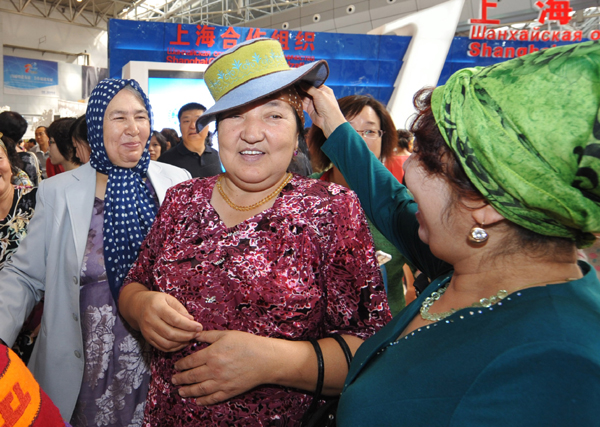
Trade between China and Shanghai Cooperation Organization members will be greatly boosted, thanks to Eurasian countries' efforts to improve the transportation channel of a new Eurasian land bridge linking China and Europe, experts have said.
Occupying three-fifths of Eurasia, six SCO members - China, Russia, Kazakhstan, Kyrgyzstan, Tajikistan and Uzbekistan, and five observer countries ― Mongolia, Pakistan, Iran, India and Afghanistan, have been working toward strengthening economic and trade cooperation within the group.
 |
|
A Uygur woman tries on a hat made in Kyrgyzstan at the First China-Eurasia Expo held in Urumqi, the Xinjiang Uygur autonomous region, in September 2011. [Photo/Xinhua] |
"More and more imported and exported goods between China and other Eurasian countries are delivered via railway on the new Eurasian land bridge. This method saves time, offers protection of goods and rapid turnover of cash flow for importers and exporters," said Guo Minjie, chairman of the logistics and technical equipment special committee at the China Transportation Association.
Stretching over 11,870 kilometers, the new Eurasian land bridge extends from China's Lianyungang city to Rotterdam, a major port city in the Netherlands, creating an uninterrupted rail link that passes through Russia and central Asian countries.
"Major trading goods, including mechanical and electronic goods with high-added value are suitable to be transported via railway on the new Eurasian land bridge," Guo said.
Compared with sea transportation, which is widely used in international trade, railway transportation is more time efficient.
According to the China Transportation Association, the delivery time of goods from China to Europe via rail is one-fifth that of the ocean transportation.
"Mechanical and electric products are easily damaged by the sea air, so more importers and exporters of these kinds of products prefer railway transport," Guo said.
"Furthermore, although the delivery cost of railway transport is higher than sea transportation, the greater time-efficiency of land transport can result in quick cash return and this is more attractive," Guo said.
China's mechanical and electronic product exports have been the major driving force of trade growth between China and other SCO members.
The export of mechanical and electronic goods account for 30 percent of China's total exports to central Asia and Russia.
Since the community was established in 2001, trade between China and other SCO countries increased from $12.1 billion to $111 billion in 2011.